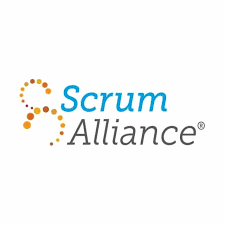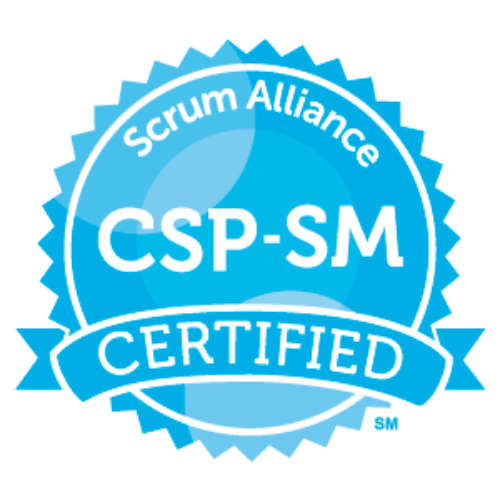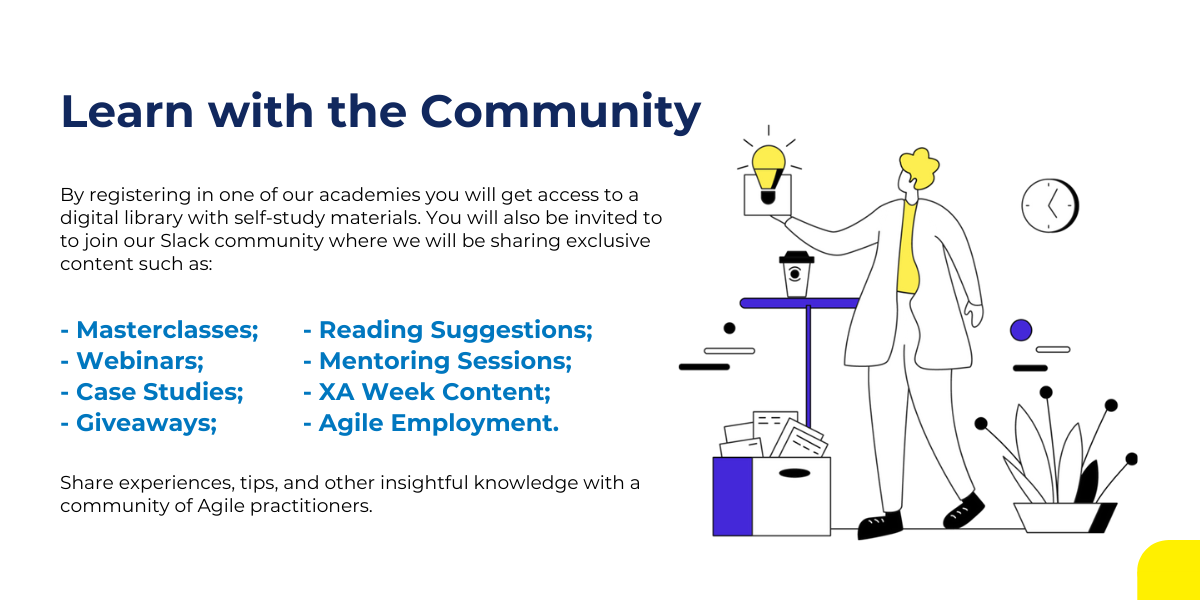Includes Certified Scrum Professional - ScrumMaster (CSP-SM)® Course


What will you receive:
- Course presentation slides and all materials
- Certified Scrum Professional - ScrumMaster (CSP-SM)® certification on successful completion of the programme
- Two years membership to the Scrum Alliance
- Exclusive CSP® events with other leaders in Scrum and Agile
- A free Premium subscription to the world's largest Agile assessment: Comparative Agility®
- Access to exclusive Agile Thinkers Academy Digital library
- Agile Thinkers Academy Slack community
- Agile Thinkers Academy Certificate of Attendance
Attendees will receive the Certification Credential:
- Scrum Master Certification
- A Scrum Alliance Membership
- Access to the Scrum Alliance Community
Certifying Bodies & Exams - Requirements
You may take the CSP-SM educational offering at any time after completing your A- CSM certification, and must have at least 24 months of Scrum Master experience logged into your Scrum Alliance profile before you are eligible to receive your CSP-SM certification.
PMI Professional Development Units (PDU)
Attendees may be eligible to apply for PDU towards their continuing education requirements with PMI
- 16 Professional Development Units (PDUs) from the Project Management Institute (PMI)
- 16 Scrum Education Units (SEUs) from the Scrum Alliance
Description
Certified Scrum Professionals challenge their teams to improve the way Scrum and Agile principles are applied. They have demonstrated experience, documented training, and proven knowledge in Scrum.
Are you ready to take your knowledge and skillset in your role as Scrum Master to the next level? If so, it’s time to elevate your career further by earning the Certified Scrum Professional®-ScrumMaster (CSP®-SM) certification.
Learn to find practical solutions and improve your implementation of Scrum in the workplace.
Agenda
1. Lean, Agile & Scrum
- Origins of Lean Thinking
- Core concepts of Lean Thinking as applied to Scrum
- The five wastes in product development and the seven wastes in Lean manufacturing
- Agile development practices in Lean practices
2. ScrumMaster Core Competencies
- Facilitation
- Differentiate at least three alternatives to open discussion.
- Identify at least three actions the facilitator can perform to support the development of an inclusive
solution. - Apply at least three visual facilitation techniques for a collaborative session.
- Identify at least three practices for facilitating remote meetings.
- Coaching and Training
- Create a coaching agreement.
- Discuss the importance of at least two fundamental coaching assumptions.
- List at least three fundamental psychological concepts that help transform individual behavior.
- Develop and teach at least one topic related to Scrum or agile.
3. Service to the Scrum Team
- Team Dynamics
- Appraise at least two different models for team development.
Compare at least three techniques for improving team effectiveness.
- Appraise at least two different models for team development.
- Scrum Teams
- Describe at least five responsibilities for Scrum Team members and stakeholders when forming a new
Scrum Team. - Plan the launch of a new Scrum Team.
- Propose strategies to fill in missing skills or capabilities the Scrum Team needs to create successful
products. - Illustrate how at least one element of software craftsmanship applies to their work.
- Describe at least five responsibilities for Scrum Team members and stakeholders when forming a new
4. Service to the Product Owner
- Apply at least two techniques for moving from Product Goal to Product Backlog.
- Appraise at least three criteria that can be used for structuring a complex or multi-team Product
Backlog.
5. Service to the Organization
- Organizational Development
- Compare at least two systemic approaches for helping organizations improve their Scrum adoption.
- Analyze your approach to a complex intervention that addresses the root cause(s) of an organizational
impediment. - Summarize at least two tangible examples of how they changed the culture of their team or
organization. - Evaluate how their Scrum Team and/or organization could benefit from the adoption of the latest
definition of Scrum.
- Scaling Scrum
- Contrast at least two patterns for scaling the Product Owner role.
- Experiment with at least three techniques to improve inter-team collaboration.
- Plan the launch of multiple Scrum Teams.
6. Advanced Scrum Mastery
- Outline a personal development strategy toward Scrum Mastery.
- Practice mentoring someone.
Course Audience
The CSP-SM course is appropriate for Advanced Certified Scrum Masters with at least 2 years experience as a Scrum Master.
This is the perfect opportunity to develop into a true expert in the principles and practices of Scrum within an Agile team or organization, whilst completing your journey towards becoming a Certified Scrum Professional.
You can still attend the class if you are short of your required experience. You will only receive certification after the full 2 years is completed.
Prerequisites
Participants should:
- Hold an active Advanced Certified Scrum Master (A-CSM) certification with Scrum Alliance.
- Have at least 24 months of work experience specific to the role of Scrum Master (within the past 5 years)

Training Remotely | Guidelines for a Successful Experience

Congratulations on joining Agile Thinkers remote courses. We are committed to facilitating a pleasant and enriching experience for all our attendees.
That's is why it is critically important that we are clarifying how we're going to work together to be most effective. So, let's develop some working agreements and suggestions to encourage the type of team environment that we want to foster during our training sessions.
Before the training starts:
1. Inform your co-workers/colleagues what will be the time you're attending training, and you shouldn't' be interrupted;
2. Look for a comfortable and quiet place to set your training spot;
3. Reduce distractions, noises and background interference;
4. Test your internet signal and guarantee you have a good connection;
5. Please please take some time to explore the tools and how to login;
6. Visit the toilet 10m before the session starts;
7. Stay hydrated;
8. Bring a notebook and a pen with you;
9. Limit interruptions from family members;
10. Make sure you turn off Outlook, gmail, Slack, WhatsApp, Skype or other sources of interruption;
11. If you can, select flight mode on your phone;
12. Test your earphones.
During Training:
1. While there are no questions, confirm you are mute;
2. Ask for help if you have any questions unmuting yourself or sending a message in chat;
3. Use Chat area to address the trainer some questions. As soon as possible, we will give feedback.
4. Respect the Time-boxes;
5. Be on time so you can deliver on time;
6. Don't accept calls while you're on training unless is extremely necessary and vital for you;
7. Please keep your camera on;
8. It's completely forbidden for students to record audio or video of any kind or take pictures from the sessions without written agreement;
9. For training. and quality assurance purpose of our staff, we can record video, audio and the chat of all sessions;
10. Have fun! Enjoy your course!
Make sure you also check our FAQs
All trademarks mentioned are the property of their respective owners.